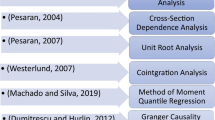Abstract
We investigate whether, and under which conditions, a revenue-neutral environmental tax reform may yield an employment double dividend, i.e., an improvement of environmental quality and an increase in aggregate employment. Using a model with two market imperfections – a rigid real wage and imperfect competition in one industry – we show that an employment dividend is plausibly obtained. However, for countries where labor taxes are high and households spend a large share of their income in favor of environmentally harmful consumption goods a double dividend can nevertheless not be obtained, for under these conditions environmental quality deteriorates.
Similar content being viewed by others
References
Bayındır-Upmann, T. and M.G. Raith (2003), 'Should High-Tax Countries Pursue Revenue-Neutral Ecological Tax Reforms?', European Economic Review 47, 41–60.
Bovenberg, A.L. (1999), 'Green Tax Reforms and the Double Dividend: an Updated Reader's Guide', International Tax and Public Finance 6, 421–443.
Bovenberg, A.L. and R.A. de Mooij (1994a), 'Environmental Levies and Distortionary Taxation', American Economic Review 84, 1085–1089.
Bovenberg, A.L. and R.A. de Mooij (1994b), 'Environmental Taxes and Labor-Market Distortions', European Journal of Political Economy 10, 655–683.
Bovenberg, A.L. and F. van der Ploeg (1994), 'Environmental Policy, Public Finance and the Labour-Market in a Second-best World', Journal of Public Economics 55, 349–390.
Bovenberg, A.L. and F. van der Ploeg (1996), 'Optimal Taxation, Public Goods and Environmental Policy with Unvoluntary Unemployment', Journal of Public Economics 62, 59–83.
Bovenberg, A.L. and F. van der Ploeg (1998a), 'Tax Reform, Structural Unemployment and the Environment', Scandinavian Journal of Economics 100, 593–610.
Bovenberg, A.L. and F. van der Ploeg (1998b), 'Consequences of Environmental Tax Reform for Unemployment and Welfare', Environmental and Resource Economics 12, 137–150.
Holmlund, B. and A.-S. Kolm (2000), 'Environmental Tax Reform in a Small Open Economy with Structural Unemployment', International Tax and Public Finance 7, 315–333.
Koskela, E. and R. Schöb (1999), 'Alleviating Unemployment: The Case for Green Tax Reforms', European Economic Review 43, 1723–1746.
Koskela, E., R. Schöb and H.-W. Sinn (1998), 'Pollution, Factor Taxation and Unemployment', International Tax and Public Finance 5, 379–396.
Ligthart, J.E. and F. van der Ploeg (1999), 'Environmental Policy, Tax Incidence and the Cost of Public Funds', Environmental and Resource Economics 13, 187–207.
Marsiliani, L. and T.I. Renström (1997), 'Imperfect Competition, Labour Market Distortions and the Double Dividend Hypothesis', Department of Economics, University of Birmingham, Discussion Paper No. 97–26.
Nielsen, S.B., L.H. Pedersen and P.B. Sørensen (1995), 'Environmental Policy, Pollution, Unemployment, and Endogenous Growth', International Tax and Public Finance 2, 185–205.
Schneider, K. (1997), 'Involuntary Unemployment and Environmental Policy: The Double Dividend Hypothesis', Scandinavian Journal of Economics 99, 45–59.
Schöb, R. (1996), 'Evaluating Tax Reforms in the Presence of Externalities', Oxford Economic Papers 48, 537–555.
Strand, J. (1998), 'Pollution Taxation and Revenue Recycling under Monopoly Unions', Scandinavian Journal of Economics 100, 765–780.
Author information
Authors and Affiliations
Rights and permissions
About this article
Cite this article
Bayındır-Upmann, T. On the Double Dividend under Imperfect Competition. Environmental and Resource Economics 28, 169–194 (2004). https://doi.org/10.1023/B:EARE.0000029917.57621.df
Issue Date:
DOI: https://doi.org/10.1023/B:EARE.0000029917.57621.df




